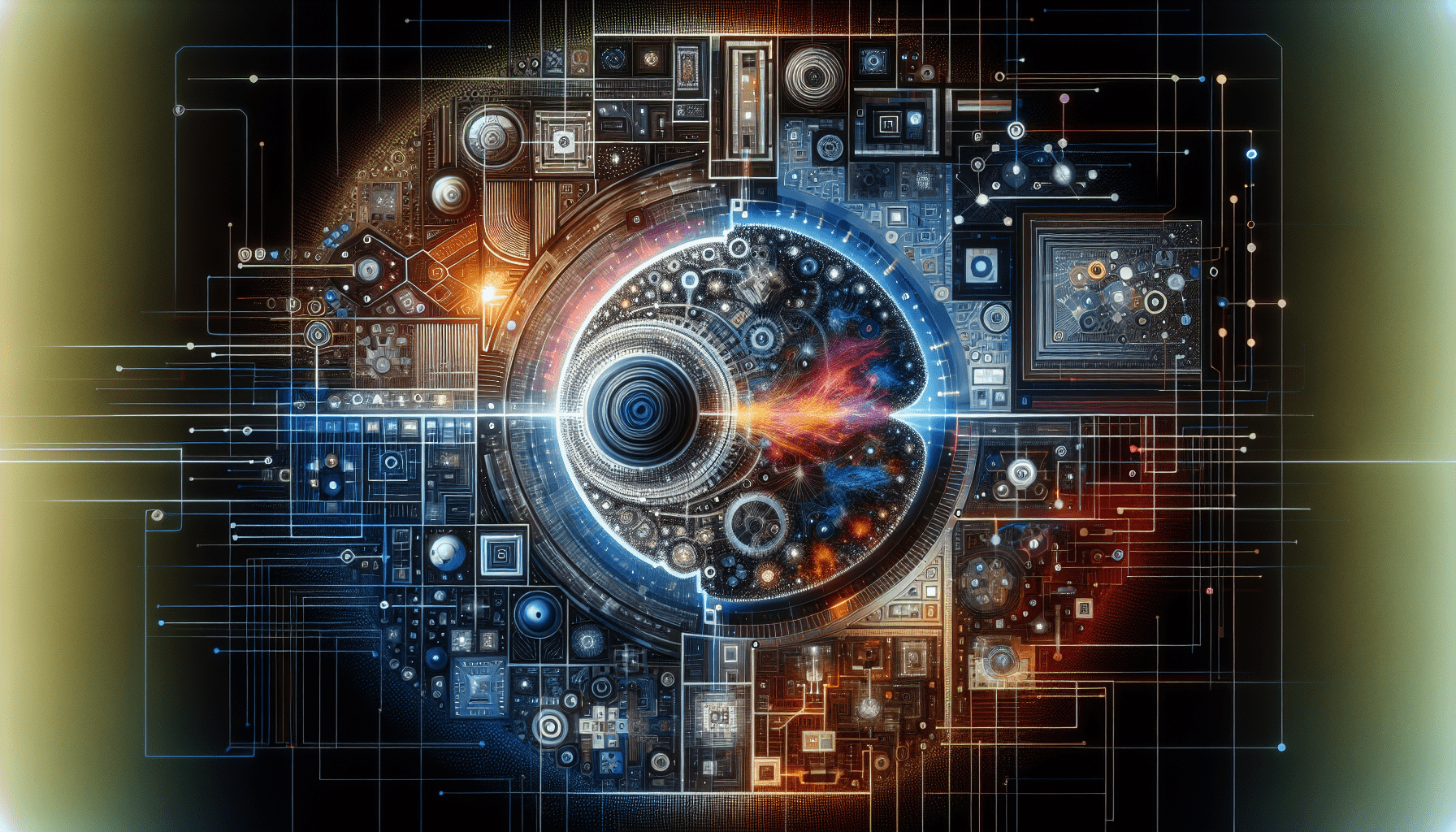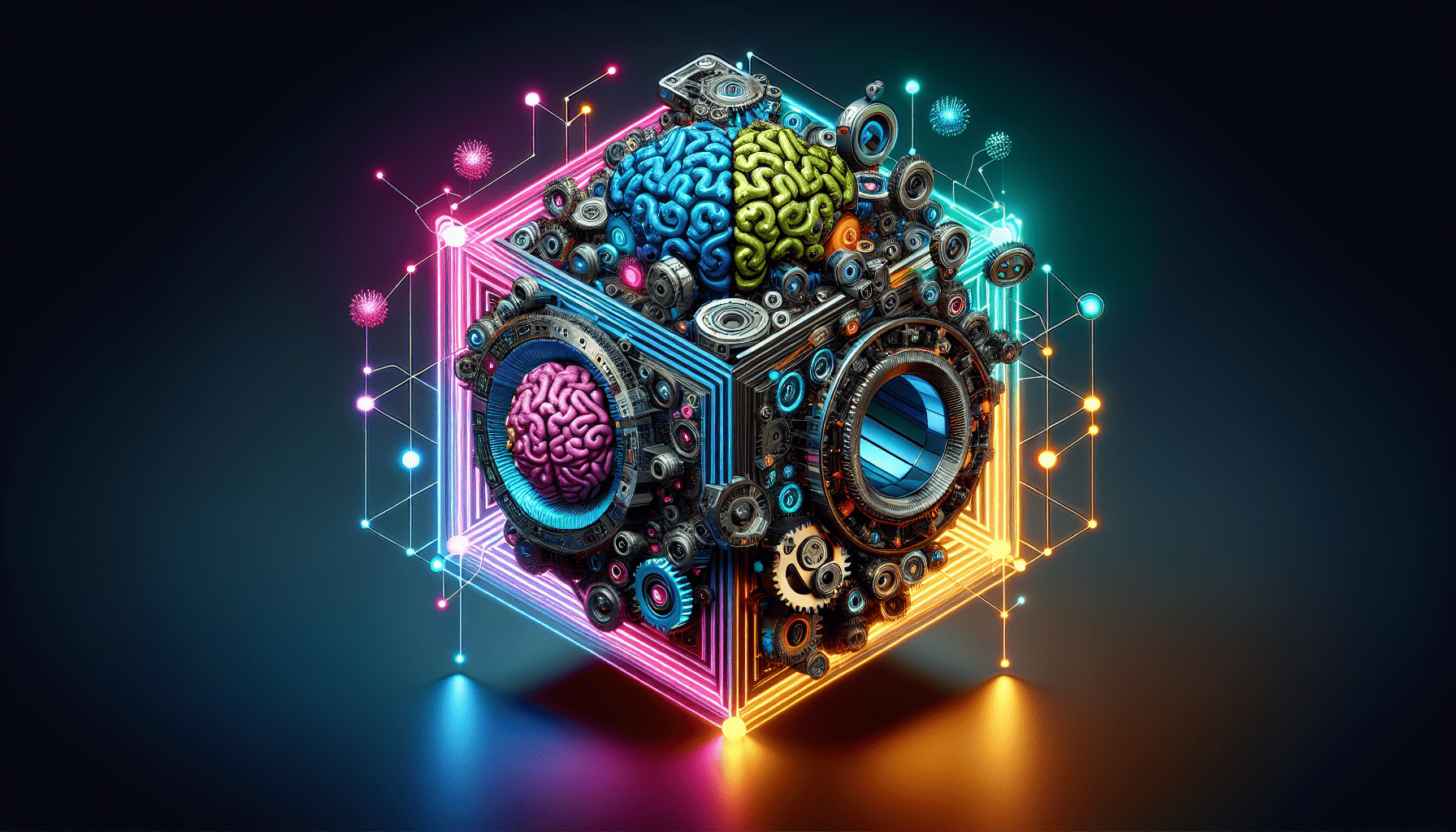Are you new to the world of artificial intelligence (AI) and feeling overwhelmed by all the technical jargon? Fear not, because “Understanding AI for Newbies” is here to simplify it all for you. In this article, we will demystify the complex concepts of AI and break them down into bite-sized pieces that anyone can grasp. Whether you’re a tech enthusiast or just curious about this rapidly evolving field, get ready to embark on an exciting journey of unraveling the mysteries of AI. Get ready to discover what AI is, how it works, and why it has become such a hot topic in recent years. So, let’s dive in and explore the fascinating world of AI together!

What is AI?
Artificial Intelligence (AI) refers to the development of computer systems that can perform tasks that would normally require human intelligence. These systems are designed to simulate human thinking and decision-making processes, allowing them to learn from data, adapt to new information, and improve their performance over time. AI can be thought of as machines or software that can mimic cognitive functions such as problem-solving, learning, perception, and decision-making. It is a broad field that encompasses various technologies and approaches to solving complex problems.
Definition of AI
AI is defined as the ability of machines or computer systems to perform tasks that would typically require human intelligence. This includes tasks such as speech recognition, language translation, image recognition, and decision-making. AI systems are designed to analyze data, learn from it, and make predictions or take actions based on that knowledge. The ultimate goal of AI is to create machines that can think, reason, and learn independently like humans.
Different types of AI
There are different types of AI that can be categorized based on their capabilities and level of autonomy.
-
Narrow AI: Also known as weak AI, narrow AI refers to systems that are designed for specific tasks and have a limited range of capabilities. These AI systems are highly specialized and excel in one area, such as image recognition or natural language processing. They cannot perform tasks outside their designated area of expertise.
-
General AI: Also referred to as strong AI or artificial general intelligence (AGI), general AI refers to systems that possess the ability to understand, learn, and perform any intellectual task that a human being can do. These systems have a broad range of capabilities and can adapt to new situations and solve problems across different domains.
-
Superintelligent AI: Superintelligent AI refers to AI systems that surpass human intelligence in virtually every aspect. This level of AI is still hypothetical and theoretical, and its development and implications are subjects of intense debate and speculation.
Examples of AI in everyday life
AI is becoming increasingly integrated into our everyday lives and is present in various applications and technologies that we use regularly.
-
Virtual assistants: Virtual assistants like Siri, Alexa, and Google Assistant are examples of AI-powered systems that can understand natural language commands, answer questions, perform tasks, and provide recommendations.
-
Smart home devices: Devices like smart thermostats, security systems, and lighting systems use AI to learn patterns and preferences and adjust settings accordingly.
-
Recommendation systems: Online platforms like Amazon, Netflix, and Spotify use AI algorithms to analyze user preferences and behavior and make personalized recommendations.
-
Autonomous vehicles: Self-driving cars use AI technologies like computer vision, machine learning, and sensor fusion to navigate the roads, detect objects, and make driving decisions.
-
Fraud detection: AI algorithms are used in financial institutions to detect fraudulent transactions by analyzing patterns, anomalies, and other indicators of fraud.
AI is continuously evolving and finding new and innovative applications in various industries and domains, making our lives more convenient and efficient.
History of AI
Early beginnings of AI
The history of AI can be traced back to the early 20th century when researchers began exploring the possibilities of creating machines that could mimic human intelligence. The term “artificial intelligence” was coined in 1956 at the Dartmouth Conference, where pioneers like John McCarthy, Marvin Minsky, and others discussed the potential of creating machines that could exhibit human-like behavior.
Major milestones in AI development
Over the years, several milestones have shaped the development of AI:
-
1956: The birth of AI: The Dartmouth Conference marked the birth of AI as a formal field of study, with researchers envisioning the creation of intelligent machines.
-
1966: Eliza and natural language processing: Eliza, a computer program developed by Joseph Weizenbaum, simulated conversation by using pattern-matching techniques. This marked a significant milestone in natural language processing.
-
1997: Deep Blue defeats Garry Kasparov: IBM’s Deep Blue supercomputer defeated world chess champion Garry Kasparov, demonstrating the potential of AI in complex decision-making.
-
2011: Watson wins Jeopardy!: IBM’s Watson, an AI system, outperformed human champions in the game show Jeopardy!, showcasing advancements in natural language processing and knowledge representation.
Impact of AI on society
The impact of AI on society has been profound and far-reaching. AI has revolutionized industries, transformed business operations, and changed the lives of individuals in various ways.
-
Automation and job displacement: AI has automated many manual and repetitive tasks, leading to increased productivity and efficiency. However, there are concerns about job displacement and the need for re-skilling and re-training for the workforce.
-
Improved healthcare: AI has the potential to revolutionize healthcare by improving diagnostics, personalized medicine, drug discovery, and treatment planning. It can analyze vast amounts of medical data, identify patterns, and assist doctors in making more accurate diagnoses.
-
Enhanced customer experiences: AI-powered chatbots, virtual assistants, and personalized recommendations have transformed customer experiences in industries such as e-commerce, banking, and travel.
-
Ethical challenges: The rapid advancement of AI has raised ethical concerns such as privacy and data security, algorithmic bias and discrimination, and the development of autonomous weapons. Addressing these challenges is crucial to ensure the responsible and ethical use of AI.
How does AI work?
AI systems are built on various technologies and concepts that enable them to analyze data, learn from it, and make decisions or predictions. Some key components of AI include:
Machine learning
Machine learning is a subset of AI that focuses on developing algorithms that can learn from data and make predictions or decisions without being explicitly programmed. It involves training a model with input data and allowing it to learn patterns, relationships, and insights from that data to make informed predictions or decisions. Machine learning can be categorized into three types: supervised learning, unsupervised learning, and reinforcement learning.
Deep learning
Deep learning is a subfield of machine learning that focuses on training deep neural networks to learn and make predictions. Deep neural networks are constructed with multiple layers of interconnected artificial neurons that mimic the structure and function of the human brain. They can process and analyze complex data such as images, videos, and natural language with remarkable accuracy.
Neural networks
Neural networks are computational models inspired by the structure and function of biological neural networks in the human brain. They consist of interconnected nodes called artificial neurons or “perceptrons” that process and transmit information. Neural networks can be used for tasks such as pattern recognition, image classification, and speech recognition.
Natural language processing
Natural language processing (NLP) focuses on enabling computers to understand, interpret, and generate human language. NLP techniques involve tasks such as language translation, sentiment analysis, speech recognition, and information extraction. NLP algorithms use statistical, machine learning, and deep learning approaches to process and analyze language data.
By leveraging these technologies and techniques, AI systems can process massive amounts of data, learn from patterns and insights, and make intelligent decisions or predictions.
Applications of AI
AI has found applications in various industries and domains. Some notable examples include:
AI in healthcare
AI is transforming healthcare by improving diagnostics, personalized treatment plans, drug discovery, and patient monitoring. It can analyze medical images, such as X-rays and MRIs, to assist doctors in detecting and diagnosing diseases. AI-powered chatbots and virtual health assistants can provide 24/7 support and answer medical queries.
AI in finance
In the financial industry, AI is used for fraud detection, risk assessment, algorithmic trading, and customer service. AI algorithms can analyze large volumes of financial data to detect anomalies and patterns associated with fraudulent activities. They can also make predictions and recommendations for investment decisions.
AI in transportation
AI plays a crucial role in the development of autonomous vehicles and smart transportation systems. Self-driving cars use AI technologies to analyze sensor data, detect objects, and make driving decisions. AI is also used in optimizing traffic flow, predicting travel times, and improving logistics and delivery operations.
AI in customer service
AI-powered chatbots and virtual assistants are revolutionizing customer service by providing instant and personalized support. They can handle customer inquiries, provide recommendations, and assist with various tasks. These AI systems can improve response times, reduce costs, and enhance overall customer satisfaction.
These are just a few examples of how AI is being applied to different industries. AI has the potential to transform and improve various aspects of our lives, making processes more efficient, accurate, and convenient.

Benefits and Advantages of AI
AI offers several benefits and advantages that are driving its adoption across industries and domains. Some key benefits include:
Improved efficiency and productivity
AI systems can automate repetitive and mundane tasks, freeing up human resources to focus on more complex and creative activities. This leads to increased efficiency, productivity, and cost savings for businesses.
Automation of repetitive tasks
AI can automate tasks that are time-consuming, repetitive, and prone to errors when performed by humans. Automation improves accuracy, reduces operational costs, and allows humans to focus on more strategic and value-added activities.
Enhanced decision-making
AI systems can analyze large volumes of data, extract relevant insights, and make accurate predictions or recommendations. This enables businesses to make better-informed decisions and optimize processes for improved outcomes.
Better customer experiences
AI-powered systems like chatbots and virtual assistants can provide personalized and timely support to customers, enhancing their overall experience. These systems can handle customer inquiries, offer product recommendations, and provide round-the-clock assistance.
By leveraging AI technologies, businesses can gain a competitive edge, achieve operational efficiencies, and deliver enhanced customer experiences.
Ethical Issues and Concerns
While AI brings numerous benefits, it also raises ethical issues and concerns that need to be addressed:
Job displacement and unemployment
The automation of tasks and jobs by AI systems has raised concerns about job displacement and unemployment. As AI continues to advance, certain job roles may become obsolete, necessitating the need for re-skilling and re-training of the workforce.
Privacy and data security
AI algorithms require large amounts of data to learn and make informed decisions. This raises concerns about the privacy and security of personal information. Safeguarding data and ensuring privacy should be a priority when developing and deploying AI systems.
Bias and discrimination
AI systems can be susceptible to bias and discrimination, as they learn from historical data that may contain biases. This can result in decisions that are unfair or discriminatory towards certain groups of people. Efforts should be made to ensure AI algorithms are unbiased and promote fairness and equality.
Autonomous weapons
The development of autonomous weapons powered by AI raises ethical concerns about the potential risks and consequences of weaponized AI. It raises questions about legality, accountability, and the potential for misuse. International regulations and ethical frameworks should be established to prevent the misuse of AI in weapons.
Addressing these ethical challenges and concerns is crucial to ensure the responsible and ethical development and deployment of AI technologies.

AI in Pop Culture
AI has long been a subject of fascination and speculation in popular culture. Its portrayal in movies, television, literature, and other forms of media has shaped public perceptions and fueled imagination.
AI in movies and television
Movies like “Blade Runner,” “Her,” and “Ex Machina” have explored the themes of AI, consciousness, and the relationship between humans and intelligent machines. Television shows like “Westworld” and “Black Mirror” have also delved into the ethical and societal implications of AI.
Famous AI characters
Characterizations of AI in popular culture have included notable figures such as HAL 9000 from “2001: A Space Odyssey,” the Terminator franchise’s Skynet, and C-3PO from “Star Wars.” These characters have become iconic representations of AI in various forms of media.
Sci-Fi visions of AI
Science fiction literature has provided visions of AI that range from helpful companions to powerful adversaries. Works like Isaac Asimov’s “I, Robot” and Philip K. Dick’s “Do Androids Dream of Electric Sheep?” explore the complexities of AI and its impact on society.
AI in literature
AI has been a prominent theme in literature, with various books delving into concepts such as artificial consciousness, emotion, and human-machine interactions. Authors like Ray Kurzweil and Yuval Noah Harari have examined the implications and future possibilities of AI in their writings.
AI’s presence in pop culture reflects society’s fascination, curiosity, and concerns about the potential impact of AI in our lives.
Developing AI Skills
As AI continues to evolve and shape various industries, developing AI skills becomes increasingly valuable. Here are some areas to focus on for those interested in entering the field:
Learning programming languages
Proficiency in programming languages such as Python, R, and Java is essential for developing AI applications. These languages are widely used in AI research and development and provide the foundation for writing algorithms and building AI models.
Understanding algorithms
Having a strong understanding of algorithms, including machine learning algorithms like linear regression, decision trees, and neural networks, is critical for developing AI systems. This knowledge allows for the selection and implementation of appropriate algorithms for specific tasks.
Gaining knowledge in statistics and math
AI relies heavily on statistical analysis and mathematical concepts. An understanding of probability, linear algebra, and calculus is essential for designing and training AI models. Statistical analysis helps in interpreting data and evaluating model performance.
Exploring AI frameworks and tools
Familiarity with AI frameworks and tools such as TensorFlow, PyTorch, and scikit-learn enables developers to build and deploy AI models efficiently. These frameworks provide a wide range of pre-built algorithms and tools that simplify the development process.
By acquiring these skills, individuals can position themselves for exciting career opportunities in AI research, development, and implementation.

Future Trends in AI
The field of AI is poised for significant advancements and transformative developments in the coming years. Some of the future trends to watch out for include:
Artificial General Intelligence (AGI)
Advancements in AI research may lead to the development of AGI, which refers to AI systems that possess human-level intelligence. AGI would be capable of understanding, learning, and performing any intellectual task that a human being can do. However, achieving AGI remains a challenging and complex undertaking.
Ethical AI regulations
As AI becomes more integrated into society, the need for ethical regulations and guidelines becomes crucial. Developing robust ethical frameworks and governing AI technologies ensures responsible and ethical use of AI and addresses concerns such as privacy, bias, and accountability.
AI in education
AI has the potential to transform education by personalizing learning experiences, providing intelligent tutoring, and automating administrative tasks. Adaptive learning platforms, virtual reality tools, and AI-powered content creation are some areas where AI is expected to make significant advancements in education.
AI in space exploration
AI technologies can revolutionize space exploration by enabling autonomous space missions, analyzing space data, and assisting in astronaut support and safety. AI can navigate spacecraft, analyze satellite imagery, and process vast amounts of space data.
As AI continues to evolve, these trends hold immense potential for shaping the future of AI and its applications across various domains.
Conclusion
Artificial Intelligence (AI) is a field that has the power to transform industries, enhance productivity, and improve our daily lives. It encompasses various technologies such as machine learning, deep learning, neural networks, and natural language processing. AI finds applications in healthcare, finance, transportation, customer service, and many other domains, enabling automation, efficiency, and better decision-making.
While AI offers immense benefits, it also raises ethical concerns and challenges that need careful consideration. Issues such as job displacement, privacy, bias, and weaponized AI must be addressed to ensure responsible and ethical use of AI technologies.
As AI continues to advance, developing AI skills becomes increasingly valuable. Learning programming languages, understanding algorithms and statistics, and exploring AI frameworks and tools can open up exciting opportunities in the field.
The future of AI holds promise, with possibilities such as Artificial General Intelligence, ethical regulations, AI in education, and space exploration on the horizon. By understanding AI and its potential, individuals can navigate this rapidly evolving field and contribute to shaping its future.







Leave a Reply